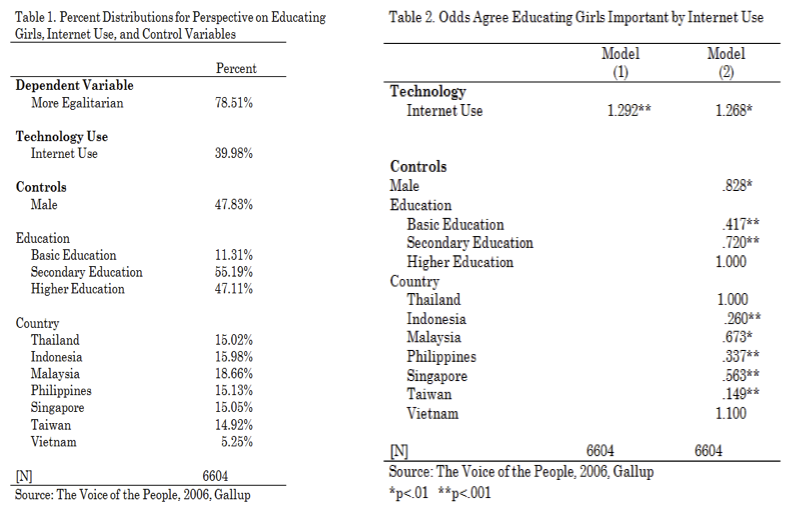Hayley Heath and Dr. Renata Forste, Department of Sociology
Based on survey data from seven countries in Southeast Asia, I examined the association between internet use and attitudes about the importance of educating girls. The sample is of 6,604 adults. Using logistic regression techniques, I found that the data supported my hypothesis; internet use is associated with respondent’s agreement that education is not more important for boys than for girls. This relationship is found even after controlling for respondent gender, education, and country.
The internet has grown extensively in connectivity, geographic distribution, and accessibility in the past several years. The expansive nature of the internet has spawned radical changes in perception of entertainment, government, business, and education (Weiser, 2000). A study by Elisabeth Friedman looked at the internet’s potential to democratize gender equality advocacy in Latin America. Based on the assumption that the widespread dissemination of the internet will inherently or inevitably lead to democratization, they advanced two ideas. “First, the internet’s potential to foster democratic relations and effective strategies in civil society depends on the consciousness with which advocates adopt, share, and deploy the technology. Second, the internet is a critical resource for marginalized or socially suspect groups and subjects, providing a unique means to express and transmit often ostracized ideas and identities” (Friedman, 2008). Friedman recognized that as the demand for gender equality has spread across the Latin region, advocates have diversified their strategies and goals. Using extensive research, this article argues that the internet is transforming both the boundaries and the structure of gender equality by facilitating rapid interaction and information exchange to help foster feminist ideals.
Table 1. lays out the percent distributions for perspective on educating girls, internet use, and the control variables, gender, education, and country. By looking at this table I learned that over 78% of the adults surveyed agreed that educating girls is as important as educating boys. I also learned that about 40% of the respondents had used the internet in the past month. The gender demographic resulted in 48% of the respondents being male. The educational status attained was laid out that most of the respondents had a secondary education (55%), with 47% having attended higher education, and 11% completing only primary school.
Table 2 is made up of the odds that the respondent agrees that educating girls is important by looking at their internet use. After running the logistic regression we learn that respondents that used the internet in the past month were 29% more likely to agree that it is just as important to educate girls as boys relative to those that had not used the internet (model 1). Even with the inclusion of controls for gender, education and country, internet use is still associated with attitudes about gender equality in education; the odds decreased only slightly – those that used the internet were 27% more likely to agree relative to those that had not used the internet (model 2). In addition, men were 17% less likely to agree that it was just as important to educate girls as boys relative to women. Among all respondents, agreement that educating girls is as important as educating boys increased with education – respondents with a basic education were 58% less likely to agree that girls and boys should be educated equally compared to those with higher education and respondents with only secondary education were 28% less likely to agree relative to those with higher education.
After examining the data that was collected, I found that internet use is associated with agreement that educating girls is as important as educating boys independent of respondent sex, education, and country of residence in Southeast Asia. Scholars can use this information to more clearly understand the influence of the internet around the world, as well as how different cultures perceive gender and education. Since the internet is becoming increasingly more useful in many countries around the world, it is important to understand the kind of impact it may have on important issues, such as the education of girls. This project was displayed as a poster at the Fulton Mentoring Conference at Brigham Young University where it took first place in the Sociology Department.
Further research should be done on this topic since there is little existing literature that can be examined on this issue. This research can be extended to examine other parts of the world. Learning how the internet affects educational attitudes in various countries of the world can help the academic world understand how great of an impact internet use really has.
References
- Weiser, Eric B. 2000. “Gender Differences in Internet Use Patterns and Internet Application Preferences: A Two- Sample Comparison.” Cyber Psychology & Behavior, 3(2):167-178.
- Friedman, Elisabeth Jay. 2008. “The Reality of Virtual Reality: The Internet and Gender Equality Advocacy in Latin America.” Latin America Politics and Society, 47(3):1-34

